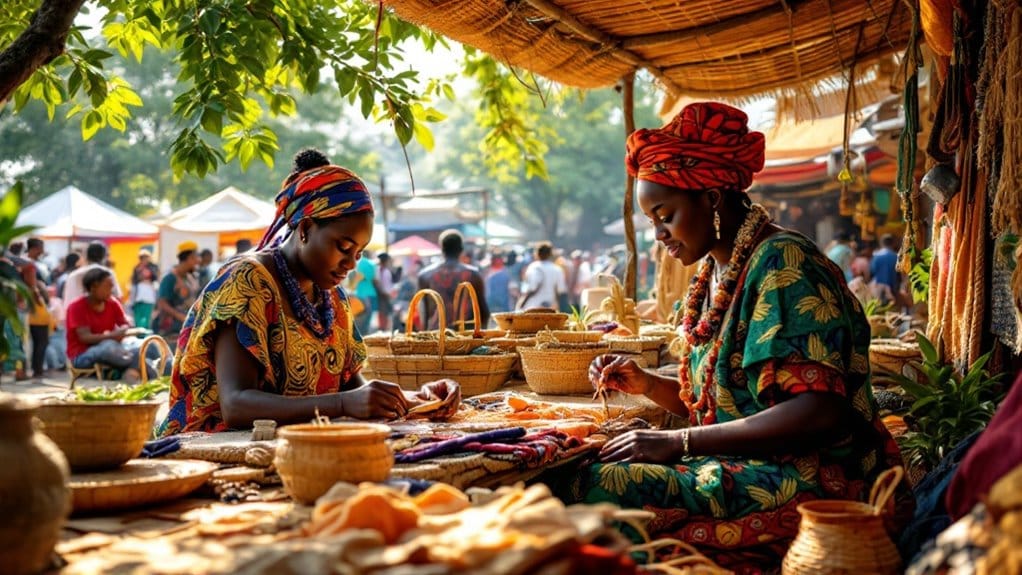In African indigenous craftsmanship, you'll find five standout sustainable practices. First, artisans use local materials like cotton and raffia to reduce transportation impacts. Next, natural dyes from plants replace harmful synthetics, supporting a healthier environment. You'll also see a strong emphasis on fair wages and ethical production practices, which empower local artisans economically. Additionally, communities engage in skill enhancement programs, ensuring traditional techniques thrive. Finally, when you support these crafts, you're helping preserve cultural heritage and promote eco-friendly practices. Stick around to discover more about the impact and significance of these sustainable approaches.
Key Takeaways
- Utilization of local materials like cotton and raffia supports sustainable practices and reduces environmental impact.
- Adoption of natural dyes from local plants preserves cultural heritage while minimizing harm to the environment.
- Empowerment programs for artisans, especially women, promote social equity and community development.
- Fair wages and transparent supply chains ensure ethical production practices and equitable compensation for artisans.
- Collaboration with designers enhances visibility and economic opportunities for local craftsmanship, fostering sustainable livelihoods.
Traditional Craftsmanship Techniques
Traditional craftsmanship techniques in Africa showcase a rich tapestry of skills that have been honed over generations. You'll discover that local artisans create stunning pieces using local materials like cotton and raffia, dyed with natural substances that minimize environmental impact.
These traditional techniques, such as intricate beadwork and embroidery, not only preserve cultural heritage but also tell stories through their designs.
In Mali, for example, the production of mud cloth (Bogolanfini) illustrates traditional dyeing methods that utilize fermented mud, resulting in unique patterns that reinforce sustainable practices.
By engaging in basket weaving and pottery, artisans support local economies while promoting eco-friendly practices, utilizing renewable resources and reducing waste.
When designers collaborate with local artisans, they enhance the visibility of traditional craftsmanship, fostering positive change and economic empowerment.
This collective effort guarantees that these age-old techniques thrive, creating a sense of belonging within communities.
As you explore sustainable African fashion, you'll find that embracing these traditional craftsmanship techniques not only honors the past but also champions a future rooted in sustainability and respect for the environment.
Use of Eco-Friendly Materials
Eco-friendly materials are becoming a cornerstone of African craftsmanship, as designers increasingly turn to sustainable options like organic cotton, bamboo, and recycled fabrics. By embracing these eco-friendly materials, you join a movement that prioritizes ethical production and nurtures the environment.
Many African brands showcase their commitment by utilizing natural dyes derived from local plants and minerals, steering clear of harmful synthetic alternatives that pollute our planet.
You'll find that traditional fibers like raffia and sisal are also making a comeback, as artisans leverage local resources to create stunning pieces while preserving cultural heritage. This sustainable approach not only honors the past but also supports local economies by sourcing materials right from the community.
Innovative projects are transforming discarded agricultural waste, such as cotton and rice husks, into durable products that reflect both creativity and responsibility. By choosing items made from these eco-friendly materials, you're not just purchasing a product; you're investing in a sustainable future.
Each purchase contributes to a vibrant community and reinforces the importance of preserving our environment. Together, we can celebrate craftsmanship that respects both tradition and the planet.
Support for Local Artisans
Supporting local artisans is essential for fostering sustainable economies and preserving cultural heritage. When you choose to support local craftsmanship, you're not just buying a product; you're investing in a community. Collaborating with artisans guarantees fair trade practices that empower individuals, especially women and marginalized groups, through targeted empowerment programs. These initiatives enhance social equity and provide sustainable livelihoods.
Here's a quick look at the impact of supporting local artisans:
| Benefit | Description | Example |
|---|---|---|
| Economic Development | Boosts local economies through fair compensation | Artisan cooperatives |
| Cultural Preservation | Maintains traditional African techniques | Handwoven textiles |
| Eco-Friendly Practices | Encourages sustainable fashion with minimal impact | Recycled materials |
Ethical Production Practices
In the domain of African indigenous craftsmanship, ethical production practices play an essential role in promoting fairness and sustainability. You'll find that African designers are leading the way by prioritizing fair wages for artisans, ensuring they're compensated equitably for their skills and labor. These practices not only empower creators but also enhance the community impact.
Many brands champion transparent supply chains, allowing you to trace the origins of products and understand the ethical standards upheld throughout the production process. This transparency fosters a sense of trust and connection, making you feel like a part of something bigger.
Additionally, safe working conditions are vital; artisans work in environments that adhere to health and safety regulations, protecting their well-being.
As consumer awareness around ethical fashion grows, the demand for responsibly made products encourages artisans and brands to adopt sustainable practices. By choosing items crafted from locally sourced materials, you contribute to reducing environmental impact while supporting local economies.
Embracing these ethical production practices not only uplifts artisans but also fosters a strong sense of belonging within the community, creating a ripple effect of positive change.
Community Engagement and Development
Community engagement is essential in fostering sustainable practices within African indigenous craftsmanship. By partnering with local artisans, you help guarantee fair trade practices that provide equitable compensation and promote economic development. These initiatives not only empower marginalized groups, particularly women, but also preserve traditional crafts through skill enhancement programs.
Here's a glimpse of how community engagement benefits sustainable fashion:
| Aspect | Impact |
|---|---|
| Fair Trade Practices | Equitable compensation for artisans |
| Skill Enhancement | Preservation of traditional crafts |
| Economic Development | Job creation and entrepreneurial ventures |
| Educational Support | Literacy and skills development |
| Cultural Heritage | Revitalization of local craftsmanship |
Collaborations between designers and local craftspeople stimulate local economies, creating vibrant communities rooted in cultural heritage. Additionally, engaging with local NGOs and community projects addresses social challenges, enhancing resilience within the community. When you support these sustainable practices, you're not just contributing to a market; you're becoming part of a movement that values connection, empowerment, and the rich tapestry of African craftsmanship.
Frequently Asked Questions
How Do Indigenous Crafts Contribute to Cultural Identity Preservation?
Indigenous crafts play a crucial role in preserving cultural identity by weaving together stories that reflect community values.
You'll find that traditional techniques passed down through generations reinforce a sense of belonging. Engaging with crafts fosters artistic expression and encourages resource conservation.
This heritage revival not only strengthens community ties but also guarantees that generational knowledge thrives, allowing you to connect deeply with your roots and celebrate your unique identity through these meaningful practices.
What Role Does Tourism Play in Supporting Indigenous Craftsmanship?
Tourism plays an essential role in supporting indigenous craftsmanship by fostering cultural exchange and economic empowerment.
When you participate in artisan workshops, you help communities thrive while enjoying authentic experiences.
Ethical tourism encourages visitors to engage with local markets, promoting sustainable sourcing and preserving traditional practices.
Your support aids community development and preservation initiatives, ensuring these vibrant cultures continue to flourish.
Are There Specific Certifications for Sustainable Indigenous Crafts?
You might think there aren't specific certifications for sustainable indigenous crafts, but that's not true!
Certification bodies and eco labeling initiatives exist to promote ethical production and fair trade standards. By embracing sustainable sourcing and traditional techniques, these certifications guarantee quality assurance.
They also foster community involvement, creating a sense of belonging among artisans and consumers.
How Can Consumers Identify Authentic Indigenous Crafts?
To identify authentic indigenous crafts, you'll want to look for handmade authenticity and inquire about material sourcing.
Support artisan communities by choosing products that showcase traditional techniques.
Pay attention to ethical marketing practices, as they reflect the artisans' values.
Boost your consumer awareness by researching the background of the craftsmanship and engaging in craftsmanship education.
This way, you can avoid cultural appropriation and truly connect with the culture behind the art.
What Challenges Do Artisans Face in Sustainable Craftsmanship Today?
You've probably noticed how artisans face numerous challenges in sustainable craftsmanship today.
Coincidentally, market access and resource scarcity often hinder their progress. Skills are at risk of being lost due to inadequate skill transfer, while pricing pressures from competition threats make it hard to thrive.
Additionally, environmental impact and a lack of consumer awareness limit their growth.
Yet, funding opportunities can spark change, helping you support these artisans and foster a sense of belonging in their communities.
Conclusion
In embracing these sustainable practices, you're not just appreciating African indigenous craftsmanship; you're also supporting a vibrant culture, protecting the environment, and empowering local communities. By choosing eco-friendly materials, advocating for ethical production, and uplifting local artisans, you're making a difference. So, whether you're purchasing a handcrafted item or sharing these values, remember: every action counts, every choice matters, and together, we can foster a more sustainable future for artisans and their communities.








